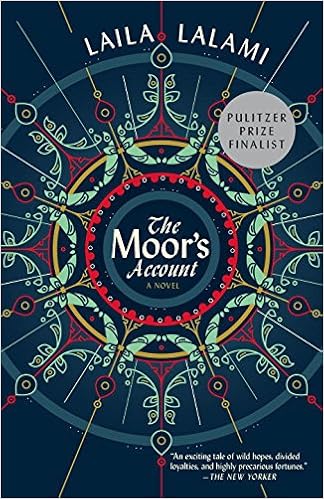 |
| amazon.com |
Historical fiction is a really great genre to read, but it seems to be dominated by tales set in Europe, specifically England. At least in my experience. And I will admit, I used to mainly read books set in England because I've always been an Anglophile. However, with my quest to continue to read outside my comfort zone and knowledge set, I've discovered some fairly interesting tidbits of history. For instance, reading The Moor's Account, by Laila Lalami, gave me insight into a much lesser-known Spanish expedition to the New World (aka North America) in the early 1500s, the Narvaez Expedition. Not only is the book about an expedition we don't usually learn about in school, but (as per the title) it's told through the eyes of a black man from North Africa, a Moor, who is a slave. He is the first recorded black man to set foot on the continent. The author lists her sources at the back of the book and I'm really curious to do more research at some point.
************************************************
Mustafa ibn Muhammad ibn Abdussalam al-Zamori, renamed Estebanico when he was brought to Spain, tells his story as a member of the Narvaez Expedition to find gold and colonize La Florida, and gives a unique perspective as he talks about present-day events and being a slave to a man of the expedition, Dorantes, but also in how he tells the story of his birth and upbringing as the son of a well-to-do notary in Azemmur, a city in Morocco. He explains, throughout the ill-fated journey, how he came to be a slave, even after he was a slaver for some time himself. As the expedition journeys through Florida and encounter many Indians, things become increasingly difficult, and most of the members of the group die. Estebanico does not get involved in the politics of the Spaniards, instead befriending the Indians when possible, and helping out wherever needed. The group loses their way and ends up in the Land of Corn, which is essentially the modern-day plains, likely Texas. Things become bad enough that even his master says he will grant his freedom if they ever make it out alive. Eventually, after much, much wandering, and many long years, the small group left is rescued and taken to Mexico. There, Estebanico continually reminds Dorantes of his promise, and Dorantes continually puts it off. At this point they have married Indian women and Estebanico is the only one who actually intends to keep his vows after being rescued. At last, Dorantes has refused to let him go free for too long, so Estebanico takes advantage of the fact that he's been asked to lead another expedition, and he and his wife go, leaving no traces behind them.
*******************************************************
Okay so that review is a bit muddled, but to be fair I read the book almost a month ago and took too long to write my review! Also, the story itself is muddled, being a tale of harrowing adventure and certain death, as well as being interspersed with vignettes from the past. And because it was written like a journal, there were no quotation marks, which honestly drove me mad. All other punctuation was great, and I realize this was a stylistic choice on the part of the author, but gah, it was annoying. Anyway, it was a great story, though I have to admit I felt that the author also took a lot of liberty in portraying white Christians as always evil, and the black Muslim as super pious and never taking any part in gruesome or promiscuous acts. But, that is her choice too, and it didn't detract enough from the story to make me quit reading.
So, I did love the book, though it was tough to follow at points. The landscape descriptions were fantastic, and it was really easy to feel the different environments they traveled through. I would encourage anyone interested in historical fiction to pick it up, especially if you have a particular interest in Spanish expeditions. And I would welcome any recommendations for historical fiction that isn't English!